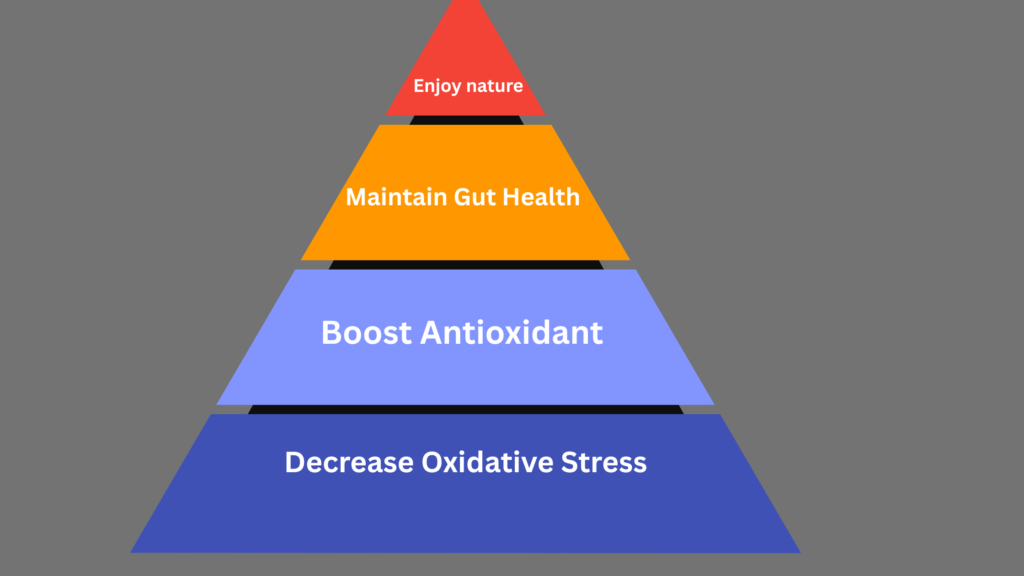
- Boost Antioxidant Intake
- Adopt Anti-Inflammatory Diet
- Hydrate
- Moderate Exercise
- Manage Stress
- Reduce environmental toxins
- Prioritize quality sleep
- Use supplements wisely
- Maintain Gut Health
- Make social connections and laugh
- Enjoy nature and sunlight
When too many free radicals overcome the body’s antioxidant defenses, it’s known as oxidative stress. This imbalance can result in cell damage, early aging, and several chronic illnesses, including heart problems, neurological conditions, and compromised immunological function. A healthy lifestyle may brush up inexact well-being and drastically lower oxidative stress. This is a comprehensive instruction on naturally and successfully reducing oxidative stress.
Boost Antioxidant Intake
Antioxidants destroy free radicals, protecting cells. Eat a range of vigorous fruits and vegetables to increase your antioxidant intake. Potent antioxidants, including vitamins C and E, flavonoids, and polyphenols, may be abundant in berries, nuts, and seeds. Dark chocolate (with a high cocoa content) and green tea also have excellent antioxidant effects. Adding spices and herbs like cinnamon, ginger, and turmeric can raise further antioxidant levels.
Adopt Anti-Inflammatory Diet
Anti-inflammatory foods are essential since inflammation leads to oxidative stress. Choose entire foods such as avocados, almonds, seeds, turmeric, olive oil, fresh herbs, and fatty fish (high in omega-3 fatty acids). Sauerkraut, kimchi, and yogurt are blueprints of fermented foods a specifically promote intestinal health, which is crucial for reducing inflammation. Cut back on processed meals, trans fats, refined carbs, and too much sugar since they can exacerbate oxidative stress and cause inflammation.
Hydrate
Water is necessary for cell activity and pollution removal. Dehydration can promote free radical accumulation, hindering detoxification. Consuming 8-10 glasses of water daily supports natural detoxification and reduces oxidative damage. Herbal teas, infused water, and hydrating fruits like cucumbers and watermelon help hydrate.
Moderate Exercise
Regular exercise boosts circulation, lowers inflammation, and strengthens the body’s antioxidant defenses. However, if the body does not adequately recover from excessive or strenuous activity, it might lead to oxidative stress. To encourage cellular repair and lessen the accumulation of free radicals, participate in moderate exercises like yoga, swimming, strength training, or brisk walking. Stretching, drinking enough water, and resting are all post-workout recovery techniques that can help reduce oxidative stress brought on by exercise.
Manage Stress
Prolonged stress raises cortisol levels, exacerbating oxidative damage and impairing immunity. Relaxation practices such as journaling, deep breathing exercises, meditation, and mindfulness can reduce the formation of free radicals and manage stress. Hobbies, time spent in nature, and gratitude exercises are other methods to brush up on mental health and lower stress levels. In addition to lowering oxidative stress levels, getting enough sleep is compulsory for stress management and cellular repair.
Reduce environmental toxins
Oxidative stress increases when people are exposed to pollutants, chemicals, and poisons. To lessen exposure, avoid smoking and binge drinking, use natural cosmetics and housekeeping items, and choose organic foods wherever feasible. Reducing exposure to heavy metals, herbicides, and industrial pollutants can help even prevent oxidative damage. Toxin exposure in daily life can also be reduced by purchasing air purifiers, switching to glass containers from plastic ones, and filtering tap water.
Prioritize quality sleep
Cellular cleansing and repair depend on sleep. Lack of sleep speeds up aging, impairs immunological function, and raises oxidative stress. Perpetuating a consistent sleep schedule, limiting screen time before bed, and creating a tempered bedtime ritual will help you get 7–9 hours of sleep. Using relaxation methods, avoiding coffee in the evening, and keeping the bedroom dark are all examples of sleep hygiene measures that may significantly enhance the quality of your sleep and lower oxidative stress.
Use supplements wisely
Some supplements can promote general health and lessen oxidative stress. Coenzyme Q10, resveratrol, curcumin, glutathione, alpha-lipoic acid, and N-acetyl cysteine (NAC) are attributed to strong antioxidant qualities. Omega-3 supplements can also promote heart and brain health and fight inflammation. Before incorporating supplements into your regimen, speaking with a healthcare provider is advisable because the correct dose and drug interactions should be considered.
Maintain Gut Health
A healthy gut microbiota greatly aids immune system support and oxidative stress reduction. Promote gut health and increase the generation of antioxidants. Prebiotic foods, including garlic, onions, leeks, asparagus, and bananas nourish good gut bacteria. A diet prohibitive in fiber from fruits, vegetables, and whole grains encourages healthy digestion and guards against oxidative stress brought on by inflammation.
Make social connections and laugh
Oxidative stress levels are directly related to emotional health. Spending time with loved ones, laughing, and having positive social interactions may lower stress hormones and enhance general wellness. Research indicates that emotional support and social interaction reduce oxidative damage and inflammation. Encouraging pleasant feelings, a sense of purpose, hobbies, volunteer work, and gratitude exercises can also help reduce oxidative stress.
Enjoy nature and sunlight
It has been demonstrated that being outside improves mood, lowers cortisol levels, and reduces stress. Sunlight succors the body and produces Vitamin D, essential for immune system function and inflammation reduction. Activities that naturally reduce oxidative stress include gardening, woodland bathing, and strolling in a park.
Conclusion
To reduce oxidative stress, a comprehensive strategy incorporating stress management, hydration, a nutrient-rich diet, and an active lifestyle is needed. Implementing these methods into your everyday practice may prevent cell damage, delay aging, and support long-term health. By prioritizing these practices, you may live a happier, more energetic life free from the negative consequences of oxidative stress. Your general well-being will significantly improve if you implement these minor adjustments.
